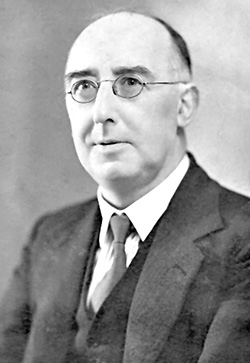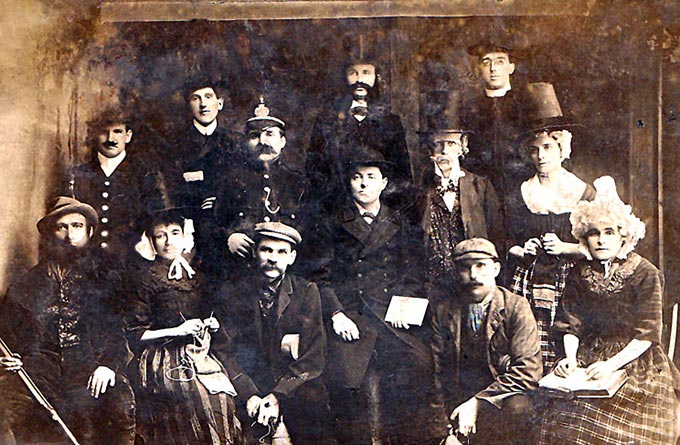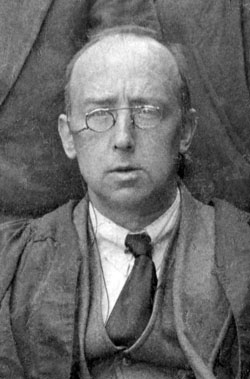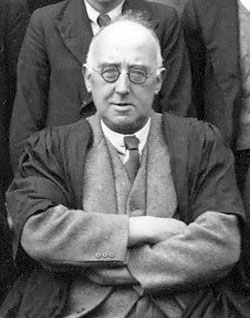Aubrey Roberts, B.A. (Wales), M.A. (Oxon.)
Teacher of History
Aberdare County School, 1906-1945

Aubrey Roberts
Aubrey Roberts was the senior teacher of history at the school for thirty six years. He was a native of Swansea but spent the greater part of his life in Aberdare, where he married the daughter of the headmaster of Park School, and where he and his wife raised their family. When he retired in 1945 he moved west to live in Tan-y-Groes, Cardiganshire, a small village about three miles inland from Aberporth. His grandson Gwilym Roberts has written this personal account of Aubrey Roberts’ career. We are most grateful to him for allowing us to reproduce the text here.
A Profile of Aubrey Roberts
by Gwilym Roberts
My only recollection of my grandfather was when as a small boy of five I watched him shelling peas seated in the back garden of his house in Cardiganshire. He was 75 then and had been retired for ten years. I have researched his early life, and discovered many things that were new to me.
He was born in Swansea on July 31st 1880 into a family where his father Thomas Roberts was the headmaster of the local elementary school1. He actually lived in the school; the family had a house in the school grounds next to the main road. His forename comes from his mother Rachel, whose maiden name was Aubrey. They were fairly well off due to his father’s prodigious hard work that had elevated him from poverty to a prominent position in Swansea society. The area where he lived was one of the most polluted in the country, even by the standards of the time, due to the extensive copper smelting nearby. The family paid a high price in bereavements that seem unimaginable today. When Aubrey was five, his sister died aged 18. His 20-year-old brother died the next year and finally his mother died in 1888 when he was eight. The family were enthusiastic Congregationalists and must have drawn deeply on their religious beliefs at this time. His father just carried on with his work in the school and eventually remarried in 1894, so Aubrey had a new stepmother at the age of fourteen. His parents were both members of the local church community and instilled Aubrey with religious beliefs that remained with him into his adult life. His new mother was a widow and had also lost children. His father did have a second family but that was after Aubrey left home. His father’s second wife was a wealthy woman, and later would become wealthier still after further bereavements in her family. When Aubrey moved to Aberdare, his family were financially very secure.
There were great expectations of Aubrey as a teenager for he was now the only son. So after his years at Brynhyfryd (Board) Elementary School, 1885-92, he went to Llandovery College as a boarder until he was 19, (1892-97), passed the University of Wales matriculation examination in Latin, English, Greek, and French in 1896, and completed the remaining subject in the following year. On the basis of this, he was able to attend the University College of Wales, Aberystwyth and graduated B.A. in History in 1902 with ‘specials’ in Latin & Greek. In his reference from his tutor his Greek translations were described as “very creditably done” and that “He passed all his examinations with credit.” While he was at the University, he was a keen sportsman and took part in a swimming race, which was then conducted in the sea. He finished third in the 100 yards race on that occasion. He also played rugby for the College against other universities. While he was at home from university in Swansea he attended a banquet held by the Landore and District Junior Liberal Association. He was now 20, and his political beliefs were taking shape for the future.
In 1902 he obtained a post as a Junior Master at Aberdare County School. He was only there for a year, however, and in 1903 he obtained a place at Oxford University and attended Jesus College. This would seem a risky move financially, there was no guarantee he would get his job back, but he probably had enthusiastic backing from his family, and the opportunity to go to Oxford could not be missed. In 1905, he was the prime organiser of the St. David’s Day dinner in The Randolph Hotel, Oxford for his fellow undergraduates, which included entertainment from “a good array of Welsh talent.” Details of his time at Oxford are at present sketchy, but he played rugby for the College and obtained a B.A. in history (1907), which was later converted (circa 1912) into an M.A.
Even though the records show his Oxford degree was awarded in 1907, they also show that in 1906, he was able to return to Aberdare Boys County School as a History Master, a position he retained for the remainder of his entire adult working life. In this respect, he followed his father, who was a headmaster at the same school in Swansea for over 25 years. He made a life for himself in Aberdare, throwing himself enthusiastically into a range of activities in the local community. As a keen sportsman, he had an interest in the school rugby team, but by now, his interest was as a referee. He did ‘take part’ in one match however, played in heavy mist. He was again the referee but the players were so confused by the lack of visibility that he was mistaken for a player and tackled several times in mistake for an opponent. The school won the match but the opposing team must have been quite stoical about the situation as they were called “The Laughing Philosophers.” It appears he was also involved in coaching the school team, but this role was ably taken over by the physical education master, E.J. Excell, when he arrived in 1922. Aubrey still retained an input in picking the team, and was pictured with the first XV in 1925. He was not adverse to the heresy of refereeing soccer matches on occasion also. Later in life, he was an avid follower of the Welsh rugby team and saw all the matches at Cardiff Arms Park. His pupils were able to exploit this interest on occasions. If they hadn’t completed their homework they would draw the discussion in the class to the most recent match. They would then ply him with questions about the Welsh tactics in the match. The resultant discussions would then occupy the remainder of the history lesson as he gave them a detailed analysis of the match. He instilled this passion into his only son, Kenwyn2 who was a pupil in the school, 1930-36.
One of Aubrey’s interests was in amateur dramatics, and he became a member of the local society. Maybe it was his classical training, studying ancient Greek drama that inspired him to become involved. In 1908 he appeared in Daniel Owen’s Welsh drama “Rhys Lewis,” and received enthusiastic reviews3 for his portrayal of Mr. Brown, the sporting parson, which required him to speak in “pigeon” Welsh. The drama was performed in local venues, but was such a success that in the following March they were invited to appear at the Cory Hall in Cardiff by the Cymry Cymreig fraternity for a St. David’s Day festival performance. The drama was described as, “A fine performance by Aberdare artists,” and the society were even contemplating visiting America to foster Welsh sentiment. The drama was seen as supporting the proposal to establish a Welsh National Theatre. After this however, things seemed to calm down a little, but he remained involved in the society and helped in an organising role thereafter. He was a competent singer and entered one of the events - a school poetry recitation and singing contest. Four staff members competed, and the result was a four-way draw with no one judged to be the best.

Aubrey Roberts, top right, with the cast of “Rhys Lewis” by Daniel Owen.
He attended many social functions about this time, including a whist drive and dance held by the Park School teachers, which was also attended by his future wife, Bronwen Griffiths. He knew her father, John Griffiths, through the local Cymdeithas Cymrodorion and his involvement with the Young Liberals. She was recorded as speaking at some of the meetings and they shared many interests. According to family legend they met at a teacher’s conference, she was an art teacher, but they must have already known each other by this time. They were both Congregationalists and were married in the summer of 1910 at the Tabernacle Church, Duke Street, Aberdare by the Reverend J. Morgan Jones who seems to have been one of Aubrey’s friends from UCW Aberystwyth. Afterwards they took the train to South Devon for the honeymoon and the wedding guests had a day out at Ystradfellte. After the honeymoon, they settled into 50 Llewellyn Street, Trecynon and were able to afford a domestic servant. Children soon followed: Eryl in 1911 and Betty in 1914. By the time Betty was born, they had left Llewellyn Street and were living at 33 Broniestyn Terrace4. More children followed, Morwen was born in 1915 and Kenwyn (my father) in 1917. Finally in 1923 their last child Rhian was born. The family took advantage of the long school holidays, and went camping in various locations around South and West Wales. Among the locations were Manorbier, Mwnt, and the coast up to Aberystwyth. In 1926, tragedy struck when their daughter Betty died of meningitis at the age of 12. She was described as a kind friendly child and everyone was fond of her.
Aubrey was an enthusiastic member of the Young Liberals, (The National League of Young Liberals), and was a founder member of the Aberdare branch in 1910. His political beliefs followed those of his father, and he was already taking an interest while he was at university. The chairman of the new branch was his friend, Rev. J. Morgan Jones, whilst Aubrey was appointed secretary. They also encouraged the formation of other branches in the area in the months ahead and were invited to speak at some of the inaugural meetings. His addresses at Liberal meetings were recorded in the local press, and, thanks to these, we can discover his opinions on a wide range of issues. He was a firm believer in equality of opportunity for all, and felt that this could be achieved by a Liberal government that included MPs who came from poorer backgrounds whose election expenses were paid and who were also paid a salary to be an MP. In a historical context he believed that Liberalism sprang from the French Revolution. He was in favour of votes for women, but believed that the tactics of the suffragettes were harming their cause. He gave an address to the branch on the subject of Welsh self-government with devolved powers, which he argued in favour of, giving examples from Welsh history to support his case. There were social occasions organised as well, one of the first was a St. David’s Day banquet, which seemed to be a regular event for Aubrey at this time of year. Then there was the July outing and picnic to Ystradfellte soon after the branch was formed, the weather was perfect, which prompted some speakers to enthusiastically advocate open air speaking. He was involved in the arrangements for the proposed visit 5 of Lloyd George to Mountain Ash in the autumn of 1910. He also involved himself in the N.U.T and was a member of the local Executive Committee for some time. He was also involved in giving lectures and appearing in public debates. He conducted evening classes in 1908 on the theme of “Life and Duties of a Citizen,” and in 1910, he took part in a public debate with his friend Morgan Jones advocating the proposition that Welsh should be taught in schools. In the early war years, he gave some public awareness lectures on the recent history of the German Empire to the Carmel Fellowship.
He also found time to involve himself in a variety of activities for the Ebenezer Chapel, Trecynon6 from about 1915 onwards. He was superintendent of the Sunday School committee and among other duties helped organise Christmas treats for local children and acted as one of the judges in a church eisteddfod. He also presided over a church charity concert with a variety of miscellaneous entertainments, designed no doubt to try to lift the gloom resulting from the traumatic news coming from France and Belgium.

Aubrey Roberts, 1918-19
Initially the soldiers serving in the First World War were all volunteers, but the war losses were so severe that by 1916 compulsory conscription was introduced. By now, Aubrey had three small children and was aged 36. Initially exemptions were in place for married men with children, but as the need for men at the front grew, this was soon rescinded. Teachers were regarded as an essential occupation and were exempt from compulsory military service, but this exemption was soon tested. Men conscripted had to report for military service or appeal to a Military Service Tribunal and give reasons why they should be excused. If their appeals failed, and most did, they could be compelled to report to the military authorities immediately after the hearing. These were not isolated cases, over 700,000 appealed against being conscripted and tribunals sat all over the country. Aubrey appeared before the local tribunal7 in June 1916 and his case was adjourned pending a meeting of the school governors due to his profession. The school governors duly met two weeks later to discuss the cases of five teachers at the school including Aubrey Roberts. Two had been rejected by the military on medical grounds and of the three remaining, Aubrey had the higher classification because of his family. The discussion among the governors was reported to be heated, perhaps due to the fact that one governor was his mother-in-law, Mrs J. Griffiths. It was the rule in the County Schools that married teachers with families should not be asked to serve, however this ruling was overthrown and they referred the matter back to the tribunal for a decision. In July the matter was again considered by the tribunal. There were a number of cases including a postman refused exemption as a conscientious objector. Most of the appeals by men in various fields of work were rejected, including Aubrey Roberts. He did however have a slight reprieve; he was not to be called up unless the Board of Education gave permission. Thus, he was excused military service, but he could have been released by the Board of Education at any time until the end of the war.
During the year in which Aubrey faced the tribunal, he presided over several soirees, which involved refreshments, speeches and musical entertainment in Ebenezer Hall in appreciation of soldiers raised in Trecynon who were either home on on leave, or home because of war wounds. The soldiers were often presented with gifts provided by the chapel members.
Aubrey was certainly not a pacifist, in a political meeting in March 1918, he spoke out against the pacifist movement “capturing the trade unions” and “befogging the minds of the people,” and that “some measures should be organised to counteract its effect.” In august 1918, when the tide of war was at last moving decisively in the favour of the allies he volunteered to supervise a group of pupils from the school who had come forward to help bring in the harvest at Roch in Pembrokeshire8, where they were accommodated in Roch Castle. Aubrey took over the running of the group in its second week from another County School master, E. Ogwen Williams,

Aubrey Roberts, (1938)
Thus, the family survived the war intact, and he was able to give his attention to the more mundane world of being a history master. Many of his pupils have spoken about his time at the school. One of the best stories is the snake story. He came into class early one day. For some reason one of his pupils was exercising his pet adder. It had just reached the table at the front of the classroom when he came in. He was so shocked to discover a snake crawling on his table that his false teeth shot out in amazement. One of his best-remembered sayings was enacted when in the course of a history lesson he needed to describe someone being imprisoned. The poor unfortunate would be led away and, “cast into a deep, dark, dingy dungeon with only cobwebs to wipe away his tears.” Reviews of his lessons varied from; boring, being given lists of dates to memorise, to making his lessons come alive with his descriptions of characters and events. He was described as a popular teacher among his pupils. At the outbreak of the Second World War, Aubrey was nearly 60. The school was thrown into turmoil in 1940 when The Ilford County High School for Boys9 was evacuated to Aberdare to escape the bombing in London. They had to share classrooms with the existing pupils, a situation which lasted until 1943.
He must have been ready to retire in 1945 when he reached the age of 65. After his retirement, there seemed little to keep him in Aberdare so he moved with his wife to Tan-y-groes, a village in Cardiganshire and rented a stone-built detached house with a large garden. The village was near some of his wife “Bonny’s” relatives — her father John Griffiths (Headmaster of the Park School) came from this area originally. There were visits from his children and grandchildren, and he was affectionately known as “Pa Rob.” This is where I met my grandfather in 1955 at the age of five. He died in 1958, and his wife received a letter of condolence from the school, which we still have.
Click here
for The Aberdare Leader report of Mr Roberts’ retirement
Footnotes
- Aubrey Roberts received his elementary education at his father’s school, Brynhyfryd Elementary (Board) School, 1885-92. The school is still open and is located in Llangyfelach Road, Brynhyfryd, Swansea.
- Kenwyn Thomas Roberts, (1917-2000). After school he went to University College Cardiff.
- The duration of Daniel Owen’s play “Rhys Lewis” as performed by the Aberdare group was three hours and a quarter! It was directed by Mr E. Ogwen Williams who was also a master at the County School. A review of the performance is available on-line , in The Aberdare Leader, 23 May 1908, page 2, and in Welsh on page 6. Interestingly the whole cast had to master the ‘Flintian’ dialect of the Welsh language to perform the play authentically.
- 33 Broniestyn Terrace was the last house on the right at the bottom of the terrace.
- This visit did not actually take place. Lloyd George, who was at that time The Chancellor of the Exchequer, cancelled his visit and his speech at very short notice of a few days.The Chief Whip sent a message to the local organisers saying that it would be “difficult and undesirable” for the chancellor to attend and speak at the demonstration in Mountain Ash. It was expected the 10,000 people would have attended the demonstration.
- It is not known whether Aubrey Roberts severed his connection with Tabernacle, or found it possible to be associated simultaneously with Ebenezer as well. Tabernacle was English Congregational whilst Ebenezer, Trecynon, was Welsh Independent.
- The Military Service Tribunal that Aubrey and so many others faced in Aberdare was chaired by local solicitor Mr Charles Kenshole. Others who were members included Mrs F. Rose Davies, Councillors W. Lawrence, T. Walter Williams, Joseph Martin, Evan Jones, E. Stonelake, George Powell, William Rees J.P., and W.M. Llewellyn. Mr W.R. Morgan was the clerk, Mr A. Watkins deputy clerk, and there were also various military representatives including: Major F.N. Gray, J.P., Capt. A.L. Gregor and Sgt. Maj. Johns. The local press covered the deliberations of the military tribunal in great detail, with personal reasons for granting or refusal of application for exemption, or postponement of call up for military service clearly reported.
- There is a photograph of this Harvest Camp group from Aberdare in the Memories & Memorabilia section of this website.
- As well as the Ilford boys attending the Trecynon School, Ilford County High School for Girls was evacuated to Aberdare Girls’ County School in Plasdraw. Amongst these evacuees was a 15-year-old girl called Nina M. Mabey, who after her first marriage became the writer Nina Bawden. Her acclaimed 1973 children’s novel Carrie’s War, was loosely based upon her experiences in Aberdare.
Acknowledgements
- Many thanks to Gwilym Roberts for contributing this item to the ABGS website, and to his sister Helen for the main photograph and the Drama Group photograph.